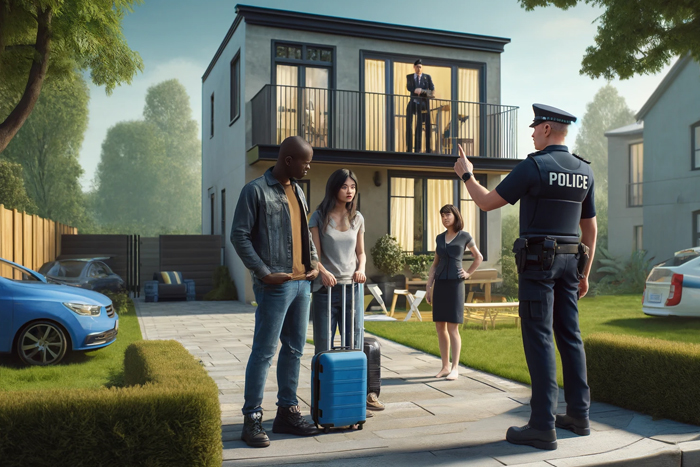Having Airbnb squatters in your vacation rental can quickly become a legal nightmare. Airbnb squatters have certain rights and protections depending on where you’re from. However, so do rental hosts. Here’s what to do if you’re faced with the impossibly complicated and equally dreaded Airbnb squatters debacle.
What is An ‘Airbnb Squatter’?
Airbnb squatters are guests who refuse to leave once their check-out date comes around. Sometimes known as “illegal occupiers”, these Airbnb guests choose not to vacate the Airbnb rental property for various reasons.
Whether due to lack of money, drug addiction, or more complex circumstances, dealing with an overstaying guest requires careful handling. It may surprise some that even vacation rentals face squatter issues, typically more common in longer-term rental agreements.
Hospitable defines Airbnb squatters as guests who fail to check out after their check-out date. In other words, they do not leave the property when they’re supposed to. Many of them are sophisticated scam artists and they know the Airbnb squatters rights. They understand how to manipulate rental laws to avoid paying rent and disrupt the property owner’s ability to manage their rental property effectively.

Why is This Issue So Common in Long-Term Bookings?
The debate over long-term vs. short-term rentals concerning Airbnb squatters often hinges on the specific agreements outlined in the vacation rental contract. Long-term renters are protected by a lease agreement, which clearly delineate responsibilities about rent payments, due dates, and procedures for emergencies and evictions. In legal disputes, courts typically refer back to these lease terms.
On the other hand, short-term rentals, such as Airbnb stays, do not afford an Airbnb host or property owners the same legal shields. Here, the language used in agreements is crucial: long-term rental agreements have tenants, while short-term rental agreements have guests. Legally, this distinction is significant.
For Airbnb hosts, it’s crucial to understand the implications of Airbnb squatters’ rights and local laws. When unwanted guests refuse to leave after their check-out dates, Airbnb immediately advises hosts to contact their insurance provider, especially if they have vacation rental insurance that may cover losses related to squatters.
To prevent Airbnb squatters, property owners should clearly state house rules and the consequences of overstaying in the short-term rental property. Understanding squatters’ rights and preparing for potential legal action can help protect the property owner’s business income and maintain control over their short-term guests.

What’s the Difference Between a Guest and a Tenant?
According to the Oxford Dictionary, a guest is “a person who is staying at a hotel”. And according to that same dictionary, a tenant is “a person who pays rent for the use of a room, building, land, etc. to the person who owns it”.
Legal Beagle says this of the difference between a guest and a tenant – “State law determines when the length of a guest’s stay transforms her into a tenant. Some states have laws that limit the length of stay and number of overnight guests. A landlord may add a clause to a lease to limit how long a guest can stay on the property. If the guest stays longer than this length of time, the landlord may consider the guest a tenant. The landlord may raise the rent if the lease provides for an increase. The landlord can also evict the guest and the tenant who invited the guest”.
Can You See Airbnb Squatters Coming?
While there are no obvious signs, there are a few things that should make you cautious about potential squatters. Seeing only a few of these signs isn’t enough to worry about, but if all of them are present, we would proceed with caution.
These signs are universal signs for concerning guests. You’d see the same things if the guest has been banned before, had a string of terrible reviews, or even caused property damage.
- No Guest Reviews
- Newly Created Profile
- No ID Verification
- No Profile Picture
- Incomplete Profile
As we said, one or two of these is not enough to reject a booking, but if all of them are present, we strongly advise that you only proceed with extreme caution as there is a high risk to host an Airbnb squatter.
Ensure your house rules are clear in your Airbnb listing to discourage overstay. Always charge a security deposit at the beginning of the Airbnb stay. This security deposit can cover potential legal fees, damages, or losses incurred due to squatters. This proactive approach helps protect the host’s property and mitigate issues with short-term rental hosts facing eviction challenges.
What Should I Do If I Have Airbnb Squatters?
Evicting people is one of the most complex scenarios any Airbnb host can face. The most important thing is to stay calm and never try to physically remove guests by force. Always have a member of law enforcement present to avoid false accusations. You never know what people will try to accuse you of in order to hide their own bad behavior.
Talk to the Guest
As a property owner, your first step in the eviction process should always be to directly communicate with the guest. Only after multiple attempts to contact them should you consider escalating the situation. This conversation can sometimes resolve the issue without further action, especially if the guest understands the potential legal consequences outlined in the vacation rental contract.
Contact Airbnb
After you’ve attempted to speak to an Airbnb squatter directly, involve the Airbnb platform. They will be able to see the dates of the booking, and they’ll have personal guest contact information that you may not have.
Airbnb will attempt to contact the Airbnb squatter and press the critical nature of the issue. Remember, Airbnb doesn’t want any bad press. Keep pressure on the platform to solve this issue. They were placed in your listing by Airbnb. Airbnb takes more than a big enough cut of the rental fee to be forced to handle issues of this nature.
Call the Police
Given the diversity of laws in the U.S., what local law enforcement can do varies widely. Contact your local police station for advice. They may agree to accompany you to the property and reiterate the need for your former guests to follow the house rules and vacate the property.
In some jurisdictions, eviction proceedings can proceed without a court order once you prove you are the property owner and the guests have overstayed their Airbnb stay.

Get a Lawyer
The next step in the eviction process is to get some legal representation. Reaching this step means you’ve tried every other avenue, but sadly have to go the expensive legal battle route. While the time, money, and loss of income caused by your Airbnb squatters likely won’t be recuperated, you can relax knowing that property owners win these battles the vast majority of the time.
In preparation for ever reaching this step, make sure you always save your communications with your short-term rental guests. You never know when you’ll need to ‘show the receipts’.
Take It To Court
Reaching the fifth and final step is highly unlikely. Chances are, the police being called on them will scare the Airbnb squatters away long before. However, if none of your previous tactics work, taking the legal route is the next option. Sadly, it’s unlikely you’ll get your money back, even if the court rules in your favor, but you will have your listing back!
Does Airbnb Offer Any Sort of Payout for Lost Revenue?
Officially, no. But like many things in life, you’ll never know unless you ask. We’ve heard from a few hosts who have lived through the Airbnb squatter nightmare and received a payout from Airbnb. Of course, they needed to file a claim first and we doubt it was an easy road, but they did manage to get some money out of Airbnb.
Final Thoughts
Sadly, there is a risk that comes with everything in life and vacation rentals are no exception. Set a list of things that you require before you allow someone to rent your property. Require your guests to be ID verified on Airbnb, for example. Or only accept guests with no negative reviews.
If you know your legal rights and follow the law down to the tee, you can handle Airbnb squatters – no matter how long it might take.






Comments are closed.